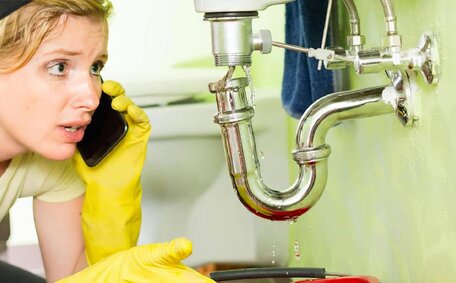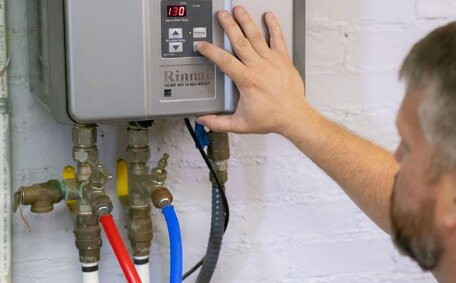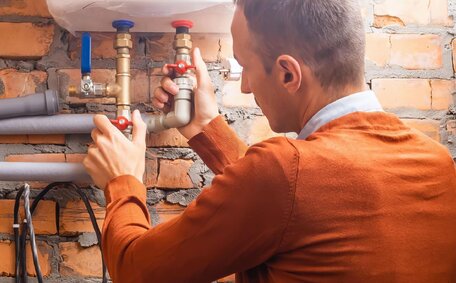Notice Any Strange Smells Coming from Your Gas Appliances
A pungent, rotten egg-like odour coming from your gas appliances like your water heater or stove is often the first telltale sign of a household gas leak.
Natural gas is intentionally engineered to have a potent, unpleasant smell added as a safety precaution. This strong odour makes it easier to detect gas leaks before they become dangerous.
If you catch a whiff of that awful sulphur smell near your appliances, do not ignore it. Strange smells around gas appliances should never be brushed off, as it likely signals a leak. Even small leaks can allow hazardous gas to silently accumulate indoors over time.
Acting quickly when you first notice an odd gas smell can prevent a dangerous situation from escalating in your home.
Be Attentive to Hissing or Whistling Noises
Besides strange smells, loud hissing or whistling sounds coming from your gas appliances or gas lines are another critical sign of a potential leak. Listen closely for any audible hissing, whistling, or roaring sounds near appliances like your furnace, water heater, stove, fireplace, or dryer.
This abnormal noise indicates pressurised gas is escaping through a break or gap somewhere in your gas line. The volume and location of the sound can help pinpoint where the leak may be situated.
For instance, a hissing sound coming directly from your stove or water heater is likely a leak in that appliance, while a whistling sound coming from the external wall or metre indicates a bigger line problem.
Small leaks tend to make faint hissing sounds, whereas larger, more hazardous leaks produce a shrill whistling or roaring. Never dismiss even quiet hissing by your appliances, as gas detectors like carbon monoxide alarms do not actually detect natural gas leaks.
Only your senses can pick up on these audible warning signs, so stay vigilant for any unusual sounds. If you suspect a leak, take immediate safety precautions. Any whistling or hissing indicates a potentially escalating and dangerous situation that requires swift action.
Look for Physical Signs of Gas Leaks
strange smells and sounds, visual cues like dead vegetation or bubbling water near gas lines can confirm leaks. Keep an eye out for any dying grass or plant life in a narrow line along underground gas pipes. Gas exposure causes vegetation above leaks to turn brown and wither.
Also watch for bubbles rising in puddles, drains, ponds, or wet soil around gas appliances or the gas metre. This indicates leaking gas is escaping underground and disturbing the water. Consult a plumber immediately if you notice these issues, as they signify gas exposure.
Examine your gas appliances closely for any signs of damage like dents, rust, or loose connections that may be causing leaks.
Use soapy water to test appliances and gas lines - bubbles will emerge at any leak sites. Never ignore visual leak signs indoors or outdoors, and contact a certified gas technician if you suspect any issues.
Beware of any Physical Symptoms When at Home
Gas leaks can cause an array of dangerous physical symptoms, especially with prolonged exposure indoors. Pay attention to how you and your family feel when at home near gas appliances or lines. Common physical indicators of an indoor gas leak include:
- Dizziness
- Nausea
- Fatigue and weakness
- Shortness of breath
- Headaches
- Irritated eyes, nose, or throat
These symptoms tend to worsen the longer you are exposed to a leak without proper ventilation. They signal your body is being poisoned by the unsafe buildup of gas. Children, pregnant women, elderly people, and those with respiratory issues are most vulnerable to these effects.
If anyone in your home experiences these unexplained symptoms regularly, a leak may be silently causing harm. Consult a technician to perform thorough leak detection and resolve any underlying issues before health complications arise. Catching subtle physical reactions early can prevent more serious sickness from developing.
What To Do if You Suspect a Gas Leak
If at any time you detect the telltale signs of a gas leak through smell, sound or sight, remain calm but act swiftly. Every second counts in a potential gas leak scenario, so follow these steps immediately:
- Extinguish all open flames - Do not smoke, light matches, operate electrical switches or create any sparks until you are certain the leak has been addressed.
- Turn off the gas supply - Locate the main gas shut off valve on the gas metre or nearest gas appliance and twist it to the 'off’ position to shut down the flow of gas.
- Open doors & windows - Ventilate the area by opening all windows and exterior doors to allow the gas to diffuse safely.
- Evacuate the building - Gather all occupants and move them to a safe distance away from the property.
- Do not use phones or electronics - Using any devices can spark an explosion, so avoid them until you are well clear of the building.
- Call your gas company - After evacuating, immediately call your gas provider’s emergency number. Never assume someone else has reported the leak.
- Contact emergency services - If the leak presents a serious hazard, call emergency services for assistance evacuating and addressing the situation.
- Do not re-enter the building - Wait for the all-clear from professionals before going back inside. A severe leak may require repairs before the property is safe to inhabit again.
In any potential gas leak situation, safety should be the number one priority. Take quick precautionary action and allow trained technicians to properly investigate and resolve the leak source before returning. A rapid, prepared response can prevent minor issues from escalating into dangerous emergencies.
How To Find The Source of a Gas Leak
Pinpointing the origin of a gas leak quickly is crucial to halt the flow of dangerous gas and make repairs. While calling a professional plumber is recommended, you can attempt to preliminarily locate leaks yourself through these common DIY methods:
Conduct a Soapy Water Test
Mix a couple drops of dish soap with water and apply the solution with a brush or spray bottle onto all visible gas pipes, joints, valves and appliance connections.
If bubbles begin surfacing, it indicates escaping gas. Mark any leak sites detected. Always turn off the gas at the mains before performing this test.
Use Gas Leak Detection Spray
Leak detection spray contains sulphur compounds that create a rotten egg smell when contact is made with natural gas. Simply spray the solution around suspected areas and any escaping gas will become evident by odour. Use sparingly and ensure proper ventilation.
Invest in Home Gas Detectors
A network of gas alarms installed at key points in your home will alert you to dangerous leaks. While standard detectors do not actually sense gas, explosive gas alarms and methane detectors help accurately pinpoint any leaks.
Beyond DIY methods, hiring a certified plumber to perform professional leak detection using advanced equipment is the most effective approach. Trained technicians have specialised tools to thoroughly and safely inspect your entire gas system and isolate the leak origin. This provides total peace of mind that any hazardous gas buildup has been resolved.
Safety Tips for Preventing Gas Leaks
Gas leaks can happen silently and escalate into dangerous situations. You can reduce the risks by taking preventative measures around gas use.
Install Gas and Carbon Monoxide Detectors
Detectors provide an alert to gas buildup before it reaches hazardous levels. Place them near appliances in living areas and bedrooms.
Have Appliances Serviced Regularly
Annual maintenance checks can catch leaks and faults before they worsen. Always use certified gas technicians.
Ensure Proper Ventilation
Ventilate kitchens, laundries and bathrooms well when operating gas appliances. Open windows or use exhaust fans.
Look for Signs of Leaks
Inspect pipes and appliances regularly for corrosion, damage or smells. Perform soapy bubble tests.
Turn Off Gas at the Main When Not in Use
Consider shutting off your gas at the mains when away from home for long periods.
Being vigilant for leak signs and proactive about servicing can greatly reduce gas-related risks in the home. Contact a plumber immediately if you ever suspect any leaks or issues.
When To Call a Professional For Help
While vigilant DIY monitoring can help detect potential gas leaks, it is crucial to involve professional technicians to thoroughly inspect, diagnose and resolve any issues. Our team of licenced gas fitters and plumbers at Ashfield Plumbing have the expertise and tools to provide comprehensive gas leak detection, repair and prevention services.
It is highly recommended to call us anytime you notice the telltale signs of a leak such as strange smells, sounds or damage around gas appliances and lines. Our technicians will act quickly to perform extensive checks, identify the leak source, and make all necessary repairs to restore safety.
We have advanced gas leak detection equipment to pinpoint any leaks you may miss, such as electronic gas detectors, pipe inspection cameras and combustible gas indicators. Our multi-point inspection covers your entire gas system.
Our licenced professionals can also diagnose and fix any underlying issues causing gas leaks, such as faulty appliance valves, corrosion in pipes, or dangerous pressure buildups. We offer maintenance and repairs for all gas appliances and fittings.
We check that your gas appliances are operating safely and efficiently without risk of carbon monoxide poisoning. This includes inspecting unusual flame colours or inconsistencies that signal combustion issues.
Regular servicing by our qualified technicians provides essential preventative maintenance to keep leaks and other gas hazards at bay. Ultimately, our expertise delivers total assurance that your gas system is compliant, fully functional and safe for your home.
Do not wait if you suspect any type of gas leak - contact Ashfield Plumbing immediately for reliable leak detection and repairs. Our priority is the safety of you and your loved ones.






